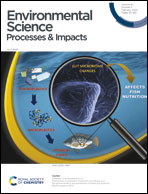MTBE exposure may increase the risk of insulin resistance in male gas station workers†
Abstract
Insulin resistance is closely related to many metabolic diseases and has become a serious public health problem worldwide. So, it is crucial to find its environmental pathogenic factors. Methyl tert-butyl ether (MTBE), a widely used unleaded gasoline additive, has been proven to affect glycolipid metabolism. However, results from population studies are lacking. For this purpose, the potential relationships between MTBE exposure and the triglyceride glucose (TyG) index, a useful surrogate marker of insulin resistance, were evaluated using a small-scale occupational population. In this study, 201 participants including occupational and non-occupational MTBE exposure workers were recruited from the Occupational Disease Prevention and Control Hospital of Huaibei, and their health examination information and blood samples with informed consent were collected. The internal exposure levels were assessed by detecting blood MTBE using solid-phase-micro-extraction gas chromatography-mass spectrometry. Then the adjusted linear regression model was used to assess the relationship between MTBE exposure and fasting plasma glucose (FPG), or TyG index. Then, receiver-operating-characteristic (ROC) curves were performed to calculate the optimal cut-off points. Multivariable and hierarchical logistic regression models were used to analyze the impact of MTBE exposure on the risk of insulin resistance. Obvious correlations were observed between blood MTBE levels with TyG index (p = 0.016) and FPG (p = 0.001). Further analysis showed that using the mean of the TyG index (8.77) as a cutoff value had a good effect on reflecting the risk of insulin resistance. Multivariable logistic regression analysis also indicated that MTBE exposure was an independent risk factor for a high TyG index (OR = 1.088, p = 0.038), which indicated that MTBE exposure might be a new environmental pathogenic factor leading to insulin resistance, and MTBE exposure might increase the risk of insulin resistance by independently elevating the TyG index in male gas station workers.



 Please wait while we load your content...
Please wait while we load your content...